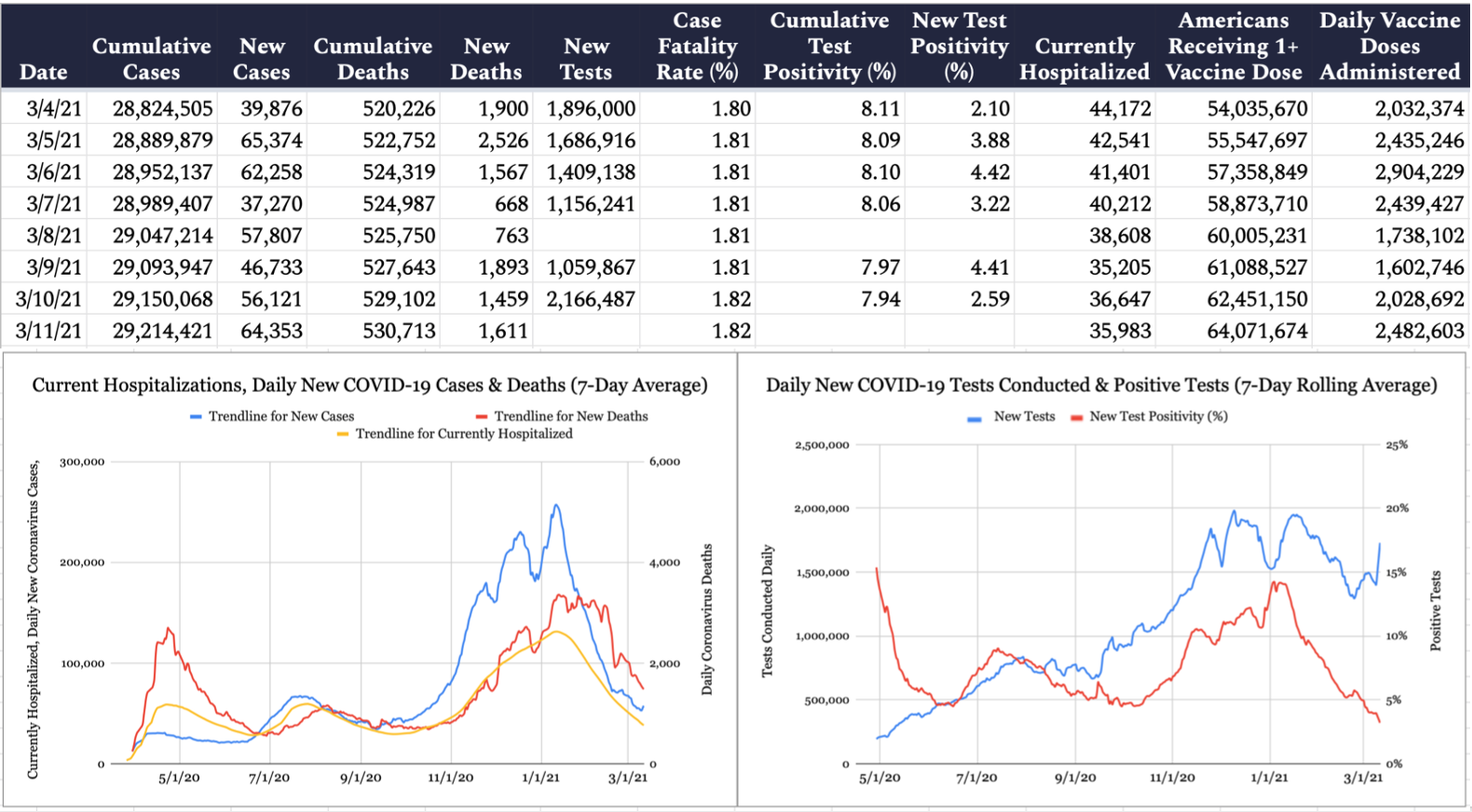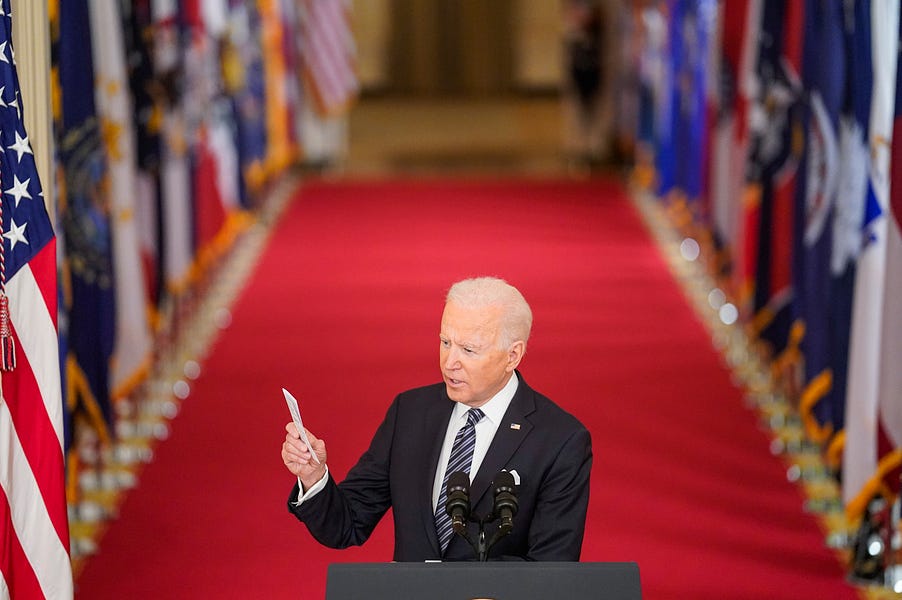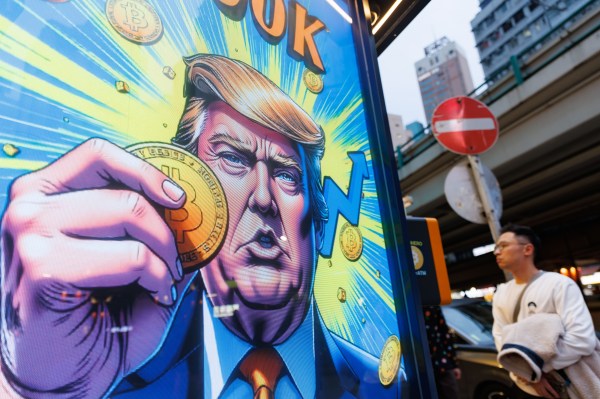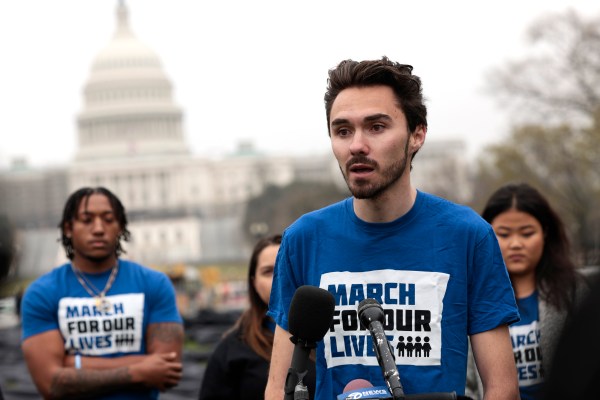Happy Friday! Don’t forget to move your clocks forward this weekend. One hour closer to this pandemic being over!
Quick Hits: Today’s Top Stories
-
President Biden signed the $1.9 trillion American Rescue Plan into law on Thursday, one day earlier than expected. He also delivered his first nationally televised primetime address as president last night, telling Americans he will direct states to make all adults eligible to be vaccinated by May 1.
-
The U.S. death rate increased by 15 percent in 2020, according to an upcoming CDC report obtained by Politico, the largest spike since 1918. For comparison, the death rate decreased 1.2 percent in 2019. More than 3 million Americans died in 2020, with COVID-19 being the third largest cause of death, behind heart disease and cancer.
-
A new analysis of the Pfizer COVID-19 vaccine in Israel found two doses to be 97 percent effective at preventing symptomatic disease, and one dose to be 85 percent effective. Importantly, the analysis also found the vaccine to be 94 percent effective at blocking asymptomatic COVID-19 infection.
-
Democrats in the New York State Assembly opened an impeachment inquiry into Gov. Andrew Cuomo yesterday, one day after an unidentified female staffer told the Albany Times Union the governor had “aggressively groped her” at the Executive Mansion last year. The incident has been referred to the Albany Police Department.
-
The House of Representatives passed two gun control bills yesterday. The first would expand background checks to those purchasing firearms over the internet or at gun shows, and the second would expand the amount of time authorities have to complete a background check before licensing a gun sale. Eight Republicans voted for the former, two for the latter. The bills are unlikely to advance in the Senate as currently written.
-
Initial jobless claims decreased by 42,000 week-over-week to 712,000 last week, the Labor Department reported on Thursday. About 20.1 million people were on some form of unemployment insurance during the week ending February 20, compared with 2.1 million people during the comparable week in 2020.
-
The United States confirmed 64,353 new cases of COVID-19 yesterday per the Johns Hopkins University COVID-19 Dashboard. An additional 1,611 deaths were attributed to the virus on Thursday, bringing the pandemic’s American death toll to 530,713. According to the Centers for Disease Control, 35,983 Americans are currently hospitalized with COVID-19, and 2,482,603 COVID-19 vaccine doses were administered yesterday. 64,071,674 Americans have now received at least one dose.

Biden: America Is Coming Back
President Joe Biden delivered his first primetime address to the nation on Thursday night, seeking to reassure a pandemic-weary public that better days are ahead, one year after the coronavirus ground life as they knew it to a halt.
“Over a year ago, no one could have imagined what we were about to go through,” he said, standing behind a podium in the White House’s East Room. “But now we’re coming through it. And it’s a shared experience that binds us together as a nation. We are bound together by the loss and the pain of the days that have gone by. We’re also bound together by the hope and the possibilities of the days in front of us.”
The president didn’t make much news in the address, but he did make one announcement that could prove significant for our younger readers. “Tonight, I’m announcing that I will direct all states, tribes, and territories to make all adults—people 18 and over—eligible to be vaccinated no later than May 1,” he said. That doesn’t mean everyone will be vaccinated by then, Biden continued, but that everyone will be able to get in line for an appointment—using a new website the administration plans to roll out in the coming weeks.
Underpromising and overdelivering has been Biden’s modus operandi on coronavirus messaging since he assumed office in January. After initially pledging to administer 100 million vaccine doses in his first 100 days—a goal the country was already on pace to meet by the end of the Trump presidency—Biden boasted yesterday we’ll hit that mark around his 60th day.
So when Biden said vaccine eligibility will open up by May 1—and that he hopes small groups “will be able to” gather for outdoor cookouts on Independence Day—know that that timeline is a relatively unambitious baseline, and likely to be exceeded. Alaska, for example, removed all vaccine eligibility requirements earlier this week, and Gov. Ron DeSantis on Wednesday said Florida will likely do the same soon.
Much of Biden’s 24-minute speech was reminiscent of a Great Depression-era fireside chat. The president conveyed a sense of empathy with Americans, who have lost and sacrificed so much the past 365 days.
“While it was different for everyone, we all lost something,” he said, holding up a notecard with the number of American deaths attributed to the virus—527,726. “A collective suffering, a collective sacrifice, a year filled with the loss of life, and the loss of living for all of us.”
“But in the loss,” Biden continued, “we saw how much there was to gain in appreciation, respect, and gratitude. Finding light in the darkness is a very American thing to do.”
The president did not mention his predecessor by name, but he made a point of telling viewers that they are owed the truth from their leaders. “This is one of the most complex operations we have ever undertaken as a nation in a long time,” he said, claiming to have put the nation on “war footing” to stamp out the virus. Competitors are collaborating to boost vaccine production, military members and retired healthcare professionals are being mobilized to administer doses, and nearly 600 federally supported vaccination centers are being set up in red and blue states across the country.
In keeping with the wartime rhetoric, Biden closed with his best Uncle Sam impersonation. “I will not relent until we beat this virus. But I need … every American to do their part,” he said. “I need you. I need you to get vaccinated when it’s your turn and when you can find an opportunity. And to help your family, your friends, your neighbors get vaccinated as well.”
“We lost faith in whether our government and our democracy can deliver on really hard things for the American people,” Biden said. “But as I stand here tonight, we’re proving once again something I’ve said time and time again. … It’s never, ever a good bet to bet against the American people. America is coming back.”
China Continues to Crack Down on Hong Kong and Uyghurs. Should the U.S. Boycott the 2022 Winter Olympics in Beijing?
In a move that completely overhauls Hong Kong’s electoral system, the National People’s Congress (NPC)—the Chinese Communist Party’s (CCP’s) parliamentary body—nearly unanimously approved a draft resolution on Thursday ensuring that only “patriots” will be permitted to serve on the city’s Legislative Council.
This new legislation is considered by international onlookers to be the final nail in the coffin of the “one country, two systems” principle that once afforded Hong Kong economic and legal autonomy. But it isn’t the CCP’s first effort to crack down on Hong Kong’s sovereignty in recent months. Last June, it implemented a sweeping national security law in Hong Kong criminalizing “terrorism,” secession, subversion, and collusion with foreign enemies. Pro-democracy protesters have felt the brunt of it.
The NPC’s latest “patriots” resolution applies a political loyalty test to Hong Kong’s largest governing body. Now, a panel in Beijing will be able to vet representatives in Hong Kong’s Legislative Council and purge any member who falls out of step with the regime.
“The greatest impact of the new legislation—overhauling Hong Kong’s electoral system—will be in terms of the messages it sends,” Fred Rocafort, a legal expert on China and former diplomat, told The Dispatch. “Beijing is making clear it expects Hongkongers to make their peace with the paramount and undisputed nature of CCP rule.”
“Beijing knows that its actions will not endear it to most Hongkongers, but it is long past caring. Instead, it wants to reinforce that it is in control. If some Hongkongers choose not to be ‘patriots,’ then so be it—but they will be marginalized,” he added. “Having seen how much of a gut-punch the implementation of the National Security Law has been, the Chinese authorities must feel these new steps will further take the wind out of its opposition in Hong Kong.”
As bad as this is, the CCP’s humanitarian atrocities extend far beyond Hong Kong’s city limits. For years now, the mainland has imprisoned and forcibly sterilized members of the Uyghur population—China’s Muslim minority—in reeducation camps inside Xianjiang. Days before President Trump left office, former Secretary of State Mike Pompeo declared Beijing’s treatment of the Uyghurs a genocide—a designation with which the Biden administration agrees. (Although State Department spokesman Ned Price got cagey earlier this week when asked if the administration believes the genocide to be ongoing, or having occurred in the past.)
Xi Jinping’s rap sheet doesn’t end there. From regional encroachment in the South China Sea and the Himalayas, to global efforts to undermine the Western world’s security apparatus via espionage and cyberattacks, Beijing’s reach is wide—and malignant.
President Biden’s National Security Adviser Jake Sullivan and Secretary of State Antony Blinken will meet with two Chinese diplomats in Alaska next week. White House Press Secretary Jen Psaki said Thursday they plan to address a series of human rights and economic concerns with the Chinese officials, “whether it’s on Taiwan, or … efforts to push back democracy in Hong Kong, or on concerns we have about the economic relationship.”
“Addressing the genocide against Uyghur Muslims is something that will be a topic of discussion with the Chinese directly next week,” Psaki added.
All of this will serve as the backdrop to a debate that is sure to intensify in the coming weeks and months: We are now less than a year out from the start of the 2022 Winter Olympics, which are set to be held in … Beijing. Should we go?
A growing number of lawmakers are adamant that a boycott of the 2022 Games is in order.
“The Chinese Communist Party is committing genocide at home while seeking to undermine the free world abroad through stealing, spying, and conducting pernicious military activities,” Rep. Liz Cheney told The Dispatch. “Holding the 2022 Olympics in China will legitimize Xi Jinping’s anti-freedom regime even as he carries out atrocities against the Uyghurs. That is simply unacceptable.”
Republican Rep. Mike Gallagher of Wisconsin also said as much Thursday. “The free world must not condone genocide by participating in the 2022 Concentration Camp Olympics,” he told The Dispatch. “Instead, the [International Olympic Committee] should rebid the games. If the IOC refuses to act, the US and our allies should boycott.”
But other Republican lawmakers don’t believe a boycott is the best way to hold Beijing to account.
“The United States should demonstrate our repudiation of China’s abuses in a way that will hurt the Chinese Communist Party—not American athletes who have trained their entire lives for this competition,” Sen. Mitt Romney—who all but saved the 2002 Salt Lake City Olympic Games—told The Dispatch. “We can do that by boycotting the Beijing Olympics economically and diplomatically, while letting the Games proceed.”
Sen. Ted Cruz told Politico a boycott would be a “serious mistake,” saying the United States “should go to Beijing, compete, and win.”
The United States famously boycotted the 1980 summer Olympics in Moscow to protest the Soviet Union’s invasion of Afghanistan a year earlier, and it came very close to boycotting the Berlin Games in 1936 as the Third Reich was establishing its stranglehold on power in Germany. “[Hitler] was really dependent on putting on a good, successful show in Berlin in ‘36 in order to demonstrate the competence, and efficiency, and mastery of his regime,” David Clay Large, author of Nazi Games: The Olympics of 1936, told The Dispatch. “Had his party been ruined by a major boycott of the Western nations—I don’t think it would have necessarily changed his policies, but it would have been a blow to his prestige, especially at home, where younger people in particular were counting on him to put on a truly successful event.”
A historian at the Fromm Institute at the University of San Francisco, Clay isn’t sure a boycott of Beijing next year would have its intended effect. “Beijing hosted the Summer Games in 2008, the argument being, well that might change them,” he said. “If anything, [a 2022 boycott] might make China even more xenophobic. You could imagine them saying—this is just more proof of the West’s envy, of the West’s desire to isolate us.”
The Biden administration has thus far kept mum on its plans. “Obviously, we’re talking about 2022, so I don’t have any specifics to share at the moment,” a State Department spokesman said earlier this week when asked about a potential boycott. “We’re consulting closely with … allies and partners at all levels to define our common concerns and establish a shared approach to China.”
The Situation on the Southern Border
A few weeks back, newest Morning Dispatcher Ryan Brown took a look at what was happening on the U.S.’ southern border, as the Biden administration began reopening Trump-era migrant facilities to house a growing number of unaccompanied minors arriving in the country.
The migrant surge has only continued since then: Axios reported last week that the shelter system is at 94 percent capacity, and the CDC recently moved to allow the facilities to flout COVID-19 social distancing guidelines to account for the overflow.
In a piece for the site today, Andrew provides an update on where things are, and why they’ve gotten this way so quickly after Biden took over.
What concrete changes did President Biden make to U.S. immigration policy that are contributing to this surge?
Two changes concerning U.S. treatment of asylum seekers at the southern border have had the greatest immediate impact: the partial rollback of Title 42, a rule the Trump administration used last year to close the border on account of the COVID pandemic, and the end of the Migrant Protection Protocols—better known as the Remain in Mexico policy—which stipulated that migrants seeking asylum at the U.S. border would remain in Mexican custody until their claim was adjudicated in court.
The administration has insisted these changes were necessary from a humanitarian perspective—thousands of migrants seeking asylum had clustered for months in slapdash camps just over the border in Mexico, living in squalid conditions while their claims inched through sluggish immigration courts. But the changes have also opened the administration to fresh criticism from both conservatives and progressives—for different reasons—as the plan to open the border bit by bit has created new issues of its own.
What typically happens when unaccompanied children are apprehended at the border?
When children are taken into custody, the government undertakes a complicated logistical process to determine what can be safely done with them while their case is pending—whether to release them into the custody of a family member already living in the U.S. or, if that proves impossible, to place them in a more permanent shelter overseen by the Office of Refugee Resettlement. When there are too many children for the government to process quickly, however, they are sometimes held temporarily in much sparer and less habitable ORR influx shelters.
What is the administration now saying about the surge?
According to the White House, such facilities are simply the best option available now given the number of migrant children who need to be processed in a short period of time.
“We can’t just undo four years of the previous administration’s actions overnight,” Roberta Jacobson, the former ambassador to Mexico who now oversees border affairs on the National Security Council, told reporters Wednesday. “Those actions didn’t just neglect our immigration system, they intentionally made it worse. When you add a pandemic to that, it will take a significant time to overcome.”
Worth Your Time
-
Utah’s Republican Gov. Spencer Cox joined Matt Lewis’ podcast this week, and he sounded like he wanted to chart a different path forward for the GOP. “There’s more to being a conservative than just ‘owning the libs,’” he argued. “There’s not much interesting policy work going on on the right. It seems we’ve just defined ourselves in opposition to whatever it is the left is doing.” Cox still defines himself as a very “conservative Republican,” but is frustrated with the direction of the party. “We spent money like drunken sailors, and then we’re surprised when the other team is spending money like that. Those are the conversations we should be having, but unfortunately we’re spending more time on Dr. Seuss. But this stuff matters and has long-term implications.”
-
As we mentioned yesterday, March 11, 2020 was when things started to get real with COVID. Buzzfeed News compiled an incredible oral history of that day, talking to NBA players, Anthony Fauci, Tom Hanks’ son, Joe Biden and Bernie Sanders campaign staff, TV producers, and many others about the day that changed the world forever. “Everyone saw my reaction,” Dallas Mavericks owner Mark Cuban said. “We went from 5% or 10% in my mind to shut down. I was stunned. If it was serious enough to shut down the NBA, it really brought home that this could be a bigger problem than any of us had imagined, not just in the NBA but around the country and the world. You could hear murmurs from the crowd as people found out.”
Presented Without Comment
Toeing the Company Line
-
The deadline set by the Trump administration to pull all U.S. troops out of Afghanistan is closing in, and Thomas Joscelyn’s latest Vital Interests lays out why the Biden team’s Afghanistan “Peace Plan” is “desperate” and filled with holes.
-
On the latest episode of Advisory Opinions, David and Sarah discuss David facing his critics in a Clubhouse session Wednesday night, before turning to the constitutionality of H.R. 1’s effort to federalize elections and the increasing number of state laws that seek to ban critical race theory from being taught in K-12 classrooms.
-
On the site today, Charlotte examines Colin Kahl’s embattled nomination for undersecretary of defense for policy. As with Neera Tanden’s failed nomination for Office of Budget and Management director, Kahl’s nomination could come down to whether Sen. Joe Manchin decides to overlook the pick’s contentious tweets.
-
Also on the site, Jonah argues comedians should have a healthy sense of skepticism of those in power rather than an instinct toward deference—including for Joe Biden. “Journalism and comedy aren’t the same thing, but they do overlap,” he writes. “Both require skepticism about the way things are, about people in power, about the binding power of conventional wisdom.”
Let Us Know
Selection Sunday is this weekend for the NCAA Men’s College Basketball tournament! Are you planning to watch March Madness this year? Who’s your pick to win it all?
Most importantly: If TMD set up a free-to-enter bracket pool next week, would you be interested?
Reporting by Declan Garvey (@declanpgarvey), Andrew Egger (@EggerDC), Haley Byrd Wilt (@byrdinator), Audrey Fahlberg (@FahlOutBerg), Charlotte Lawson (@charlotteUVA), Ryan Brown (@RyanP_Brown), and Steve Hayes (@stephenfhayes).







Please note that we at The Dispatch hold ourselves, our work, and our commenters to a higher standard than other places on the internet. We welcome comments that foster genuine debate or discussion—including comments critical of us or our work—but responses that include ad hominem attacks on fellow Dispatch members or are intended to stoke fear and anger may be moderated.
With your membership, you only have the ability to comment on The Morning Dispatch articles. Consider upgrading to join the conversation everywhere.